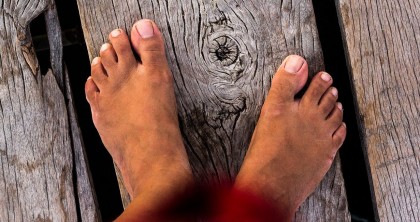Broken for Us
Kate Whittaker Cousino | Apr 20, 2017

Easter has come, but I am still meditating on the Passion, and what it tells us about the relationship between God and man—and between body and soul.
The first theological controversies the Church grappled with were over the nature of Christ’s divinity and humanity. Christ’s body was so violated, so weak and beaten and broken, that it is tempting to set it aside, to say that his body was merely a shell, a human part that he inhabited but which didn’t partake in his divinity. After all, how could God be broken? How could God die?
But that is exactly what God did and what the Church concluded then and affirms now: Christ was both God and man, whole, undivided. He was God when he died, and when he rose again. His body and human nature are as integral and proper to his person as his divine nature.
Christ died. He suffered that sundering of body and soul that awaits us all, so that we could live beyond it and know a bodily resurrection. But his Passion began before his crucifixion, and I’ve begun to wonder whether his Passion might not have begun even earlier, with his Incarnation, with the small violations of the body that plague all men and women.
We live in an age that talks about “bodily autonomy” as though self-governance of our bodies is a given, as though control of our own bodies is something we should be able to take for granted and protect as a right.
I don’t think that’s how embodiment works, at least not in a fallen world.
The bodily autonomy argument is a powerful one because it does feel obvious and intuitive. It's why rape is such a violation—because it uses the body against the individual's will, introducing a wound between will and body, self and self. It's why illness and disability can provoke so much anger and such a sense of betrayal. Our body IS our self—we are embodied souls, ensouled bodies—and the antagonism between body and soul, body and will, is a wrongness, a consequence of sin, as demonstrated by the ultimate rending of body from soul: death.
We feel the wrongness of a body that does not obey, that is subject to forces beyond our control, in the same way we feel the wrongness of death.
But just as there is no escape from death, there is no escape from bodily weakness and interdependence.
Christ was dependent on his mother while in utero. He was a weak and helpless infant. He was a child who must have had scraped knees, bug bites, hosted parasites and viruses. He must have had times of frustration when he wanted to do things his small body wasn’t yet capable of, lacked the speed to outrun bullies, lacked the strength to imitate his foster father at the work table. He was a young man who needed food, who thirsted in the desert, who was tempted, whose feet were dusty and calloused, who knew exhaustion and muscle aches.
Can God be thirsty? Hungry? Tired? Bruised? Did God struggle against bodily temptations—to run or fight when adrenaline was pumping, to lash out or break down when tired?
The early Church concluded that the answer is yes. God became man so that he could share in our humanity even unto death. God, who is wholeness, was broken in body in order to reconcile us to ourselves.
Christ took our brokenness, and made it whole.
Image via https://pixabay.com/en/foot-feet-body-pedicure-toe-skin-1784935/
